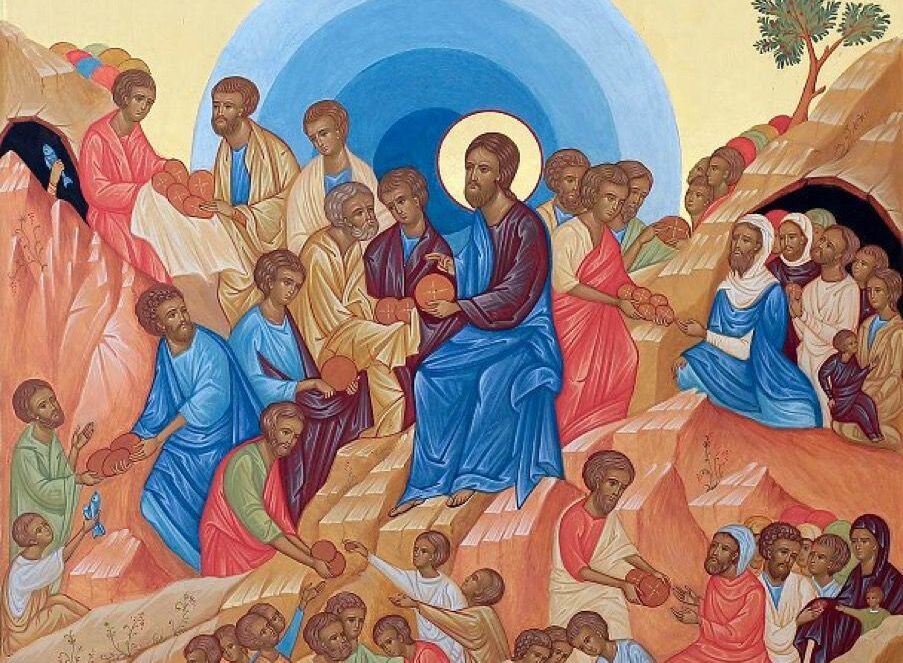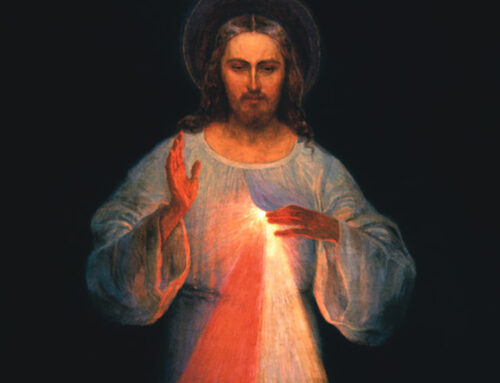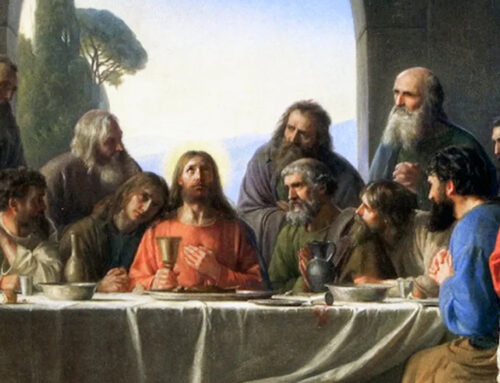Our gospel story this morning picks up just after Jesus hears the news that his cousin, St. John the Baptist, has been put to death by King Herod.
When he learns what happened to John, we read that “he withdrew in a boat to a deserted place by himself.”
Perhaps Jesus understandably wanted some space to grieve the loss of his cousin. We might recall vividly how he wept at the tomb of his friend Lazarus! How could his heart not break now when he hears the report that his cousin was martyred at the hands of the impulsive and selfish King Herod? It would make sense if Christ withdrew into the desert in order to go be alone with the Father — to entrust this difficult news into God’s hands in solitude. He is after-all not only true God, but also true man — with human emotions and affections.
But Jesus doesn’t find solitude, does he?
No, instead — “The crowds heard of this, and followed him on foot from their towns.” Imagine the scene! Jesus humbly gets into his boat, slips quietly away in sorrow and grief, and when he arrives at his destination — his private retreat as it were — he finds “vast crowds” waiting for him there.
You’d expect him to maybe be frustrated. Upset. Impatient. If I was in Jesus’ place, I know I’d look out at those people and think: “Don’t they understand I need some space?” But instead, we read in the Gospel: “When he disembarked and saw the vast crowd, his heart was moved with pity for them.”
The Greek word used here to describe the movement of Jesus’ heart could be literally translated as: “His insides turned over.”
In other words: He felt the urgency to go and be with them. He felt in the core of his being — deep down in his gut — a tangible identification with their desire, with their hunger, with their desperation to be healed. When the gospel says: “he was moved with pity,” therefore, he is experiencing much more than a mere “feeling sorry” for the crowd — a kind of sentimental sympathy for a group of people.
No, his own insides “turn over,” upside-down for them collectively and individually. His pity was a full, visceral, embodied compassion. This hits at the meaning of the mystery of the Incarnation: God took on flesh for us — in order to experience our hunger, our pain, our loss, our thirst. He became human in order for his insides to be “turned upside down” at the sight of our suffering. He invites us to come and be satisfied in Him:
“All you who are thirsty, come to the water! You who have no money, come, receive grain and eat; Come, without paying and without cost, drink wine and milk!”
He does all this from the midst of his experience of grief for his cousin, John the Baptist.
He lays aside his own need for space and privacy for a time in order to give himself now to his beloved flock. He came to love them and serve their needs. After all, “The Son of Man came not to be served but to serve.”
Just yesterday morning, my family buried my Grandma. She was a rock of faith in my life and a constant source of encouragement and joy. I miss her. My heart is broken that she is no longer here with us in the same way. Her funeral was my very first funeral mass and while it was beautiful, it was also tough. To be honest, I could probably use a little alone time right now — Like Jesus, I feel like withdrawing into the desert to find some space to process everything that has happened over the past couple of days: to be alone with the Father to pray. And I will find that time. I have to.
But right now, the Church is hungry! Right now, the Church is starving for the Eucharist. How could a priest send the crowds away with empty bellies? Sure, I could use some downtime, but that doesn’t matter as much as being here with you this morning to offer the Holy Sacrifice of the Mass — to offer you the only nourishment for your souls that satisfies: Jesus Christ Himself.
If we wait for the perfect moment to serve our neighbor — if we delay our charity for an imaginary, future period of time in our life when nothing else is demanding our attention, no crisis is distracting us, and we have plenty of free time and energy to devote to others apart from our own needs — then we’ll never end up loving the way that God truly desires us to.
St. Vincent de Paul, the patron saint of our Diocese, once put it this way:
“If a needy person requires medicine or other help during prayer time, do whatever has to be done with peace of mind. Offer the deed to God as your prayer. Do not become upset or feel guilty because you interrupted your prayer to serve the poor. God is not neglected if you leave him for such service.”
I think if by God’s grace we become more and more open to being generous and compassionate toward one another, especially when we are working through our own grief and personal suffering, then we will find healing and freedom in that self-gift. Suffering can then open us outward to others rather than create a self-centered vacuum of self-pity.
This seems to be part of the lesson Christ is teaching us in this story! He himself has suffered the lost of his cousin, and yet he opens himself up to the hunger of the crowd. Rather than sending the people away as the disciples instruct him to do, he replies: “There is no need for them to go away. You give them something to eat!”
“Give them something of yourselves!” he says! “Give them your heart! Your compassion! Let your insides be turned upside down for your neighbor who is hungry and thirsty! Don’t you dare send them away! I want to feed them with Myself, and I must come to them through your hands.”
These past few months have been really hard on all of us. We’re all dealing with a certain amount of grief. We’ve lost family and friends, we’ve lost jobs, we’ve lost our plans, we’ve lost our normal way of life — and maybe at some level we’ve even lost our hope.
We certainly need to process what has been happening to us and to our world. We need to find space and time to pray through all this and be alone with our Father. But we certainly don’t need to withdraw into self-pity and self-concern.
The invitation from the Lord today — an invitation built on that firm promise that NOTHING can separate us from the love of Christ — is to continue to be generous with our love towards others. Christ will take the little we have — the nothing we have! — and miraculously multiply it.





Fr. your message is on point. Thank you for opening your heart to the people of God. As a grandmother I can tell you that your good heart is a testimony to God and a blessing to your family. We look forward to more of your homilies, to the opportunity to participate in your Mass and to pray with you and for you. See you in Church, good Lord willing.